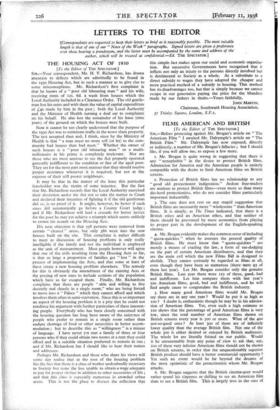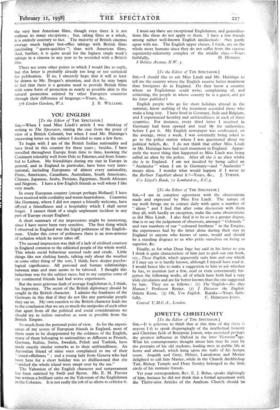FILMS AMERICAN AND BRITISH [To the Editor of THE SPECTATOR.]
SIR,—Before protesting against Mr. Brogan's article on " The American Film " I awaited Mr. Dalrymple's article on " The British Film." Mr. Dalrymple has now exposed, directly or indirectly, a number of Mr. Brogan's fallacies ; but I should like, if you will allow me, to expose a few more.
x. Mr. Brogan is quite wrong in suggesting that there is any " xenophobia " in the desire to protect British films. Admiration for America and the American people is entirely compatible with the desire to limit American films on British screens.
2. Protection of British films has no relationship to any " good old protectionist indignation." Ardent free-traders are anxious to protect British films—even more so than many die-hard protectionists, who do not consider films particularly important industrially.
3. The case does not rest on any stupid suggestion that British films are necessarily more " wholesome " than American films. It is simply, as The Times indicated, that there is a British ethos and an American ethos, and that neither of them should be prevented by mere economics from playing its proper part in the development of the English-speaking cinema.
4. Mr. Brogan evidently makes the common error of including " quota-quickies " when he assesses the general quality of British films. He must know that " quota-quickies " are merely a means of evading the law, a form of tax-dodging on the part of certain American distributors, and that they are the main evil which the new Films Bill is designed to abolish. They cannot seriously be regarded as films. at all, even though they have been so numerous (there, were 95 of them last year). Let Mr. Brogan consider only the genuine British films. Last year there were 125 of these, good, bad and indifferent. Let him compare them with last year's soo American films, good, bad and indifferent, and he will find ample cause to congratulate the British industry.
5. How many good American films would Mr. Brogan say there are in any one year ? Would he put it as high as too ? I doubt it, enthusiastic though he may be in his admira- tion of American films. Yet, even such a high estimate as zoo shows that the percentage of good American films is very low, since the total number of American films shown on British screens every year is soo or more. What of the 400 not-so-good ones ? At least 300 of them are of infinitely lower quality than the average British film. Not one of the whole 300 is either desired or enjoyed by British audiences. The whole lot are literally foisted on our public. Would it be unreasonable from any point of ,view to ask that, say, 200 of these very inferior American films should not be shown on British screens, in, order that the unquestionably superior British product should have a better commercial opportunity ? Yet such an event would be far beyond the dreams of the most optimistic of the protectionists whom Mr. Brogan attacks.
6. Mr. Brogan suggests that the British cinema-goer. would rather spend his sixpence or shilling to see an American film than to see a British film. This is largely true in the case of
the very best American films, though even there it is not without its many exceptions ; but, taking films as a whole, it is entirely contrary to fact. The majority of British cinemas average much higher box-office takings with British films (excluding " quota-quickies ") than with American films. And, further, it is quite usual for the highest single week's takings in a cinema in any year to be recorded with a British film.
There are some other points to which I would like to reply, but this letter is probably already too long or too statistical for publication. If so, I sincerely hope that it will at least be drawn to Mr. Brogan's attention, and thit he may begin to feel that there is a genuine need to provide British films with some form of protection as nearly as possible akin to the natural ' protection enjoyed by other European countries through their difference of language.—Yours, &c.,



















































 Previous page
Previous page